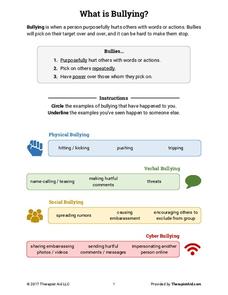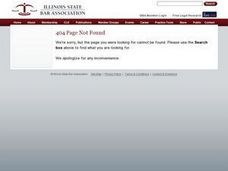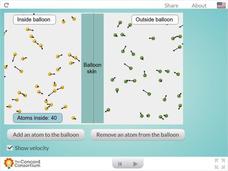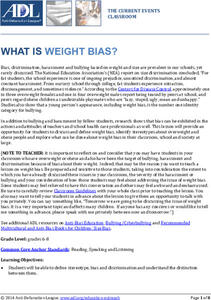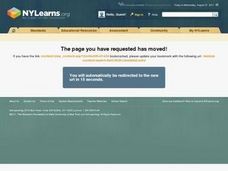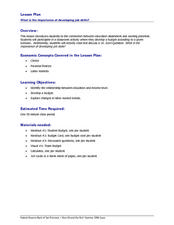NASA
Is It Alive?
Determining whether or not something is living can be more difficult than it seems. Put your young scientists to work defining their own criteria to identify life, then work with three samples to see if they are alive or not.
Curated OER
What is Theme?
What is theme, and how can you find themes in literary works? These and other questions are answered by a colorful and engaging presentation that not only defines the term but also provides easy to understand examples. The slides...
WindWise Education
What is Wind Power's Risk to Birds?
How is risk determined? Through the use of a reading passage, individuals or groups learn about bird interactions with man made structures along with wind turbines. Pupils use information from the second reading passage to conduct an...
ReadWriteThink
What is Poetry? Contrasting Poetry and Prose
Introduce middle schoolers to the different strategies used when reading prose versus poetry. Groups use a Venn diagram and a poetry analysis handout to compare the characteristics of an informational text and a poem on the same subject...
Therapist Aid
What is Bullying?
What is the definition of bullying, and how can you deal with it? Elementary and middle schoolers discuss verbal, physical, social, and cyberbullying before talking about strategies to avoid and stop bullying in their school.
Curated OER
What is a mystery?
What is a mystery? Learners complete an anagram worksheet to discover the mystery genre. First, they listen as the teacher reads from All About Mysteries and notes defining words on the board. Then they read a mystery and examine it for...
Baylor College
How Can We Find Out What Is in Water?
Using paper chromatography, water watchers discover that several substances might be dissolved even though they aren't visible. For this case, you will prepare a mixture of three different food colorings for them to experiment with. A...
Baylor College
What Is a Neuron?
Your class won't get on your nerves while doing this modeling activity! After teaching the structure and function of a neuron using the included diagrams, give individuals some clay and chenille stems so that they can make their own...
Space Awareness
What is Time?
Does it ever seem like time is slipping through your fingers? Model the passing of time with an hourglass activity in which individuals determine whether hourglasses are the most efficient way to measure time.
Baylor College
What Is the Water Cycle?
Small groups place sand and ice in a covered box, place the box in the sunlight, then observe as evaporation, condensation, and precipitation occur. These models serve as miniature water cycles and demonstrations of the three phases of...
Curated OER
What is Plagiarism?
What is plagiarism? Middle schoolers create a class definition of plagiarism and examine the importance of crediting people for their ideas. They review official school policy on plagiarism and study the consequences of presenting the...
K12 Reader
What is a Tribal Government?
What is life like on a Native American reservation? Learn about the ways a tribal government works with a reading comprehension activity. After reading a short passage, kids use context clues to answer five comprehension questions.
Teacher's Corner
What Is a Foot?
An in-class and at-home assignment, young math stars find and list items from home and school that they think are one foot in length. Once the list is made, provide everyone with rulers to measure and find the actual lengths of their items.
PBS
What Is Newsworthy?
What is news? What is newsworthy? Who decides and what criteria do they use? Introduce young journalists to the basics of reporting with this media literacy lesson.
Concord Consortium
What Is Pressure?
Balloons bring great fun to the classroom, until they break. What's a teacher to do then? Break out the balloon of the computer age with a fun interactive! Science scholars add and remove atoms from their virtual balloons and observe...
Anti-Defamation League
What Is Weight Bias?
After setting rules and expectations to create a safe place to share thoughts and feelings, scholars define the terms; stereotype, basis, and discrimination. Using a web brainstorm, learners list words associated with overweight and...
EngageNY
The Hero’s Journey, Part 1: What is a Hero?
That was heroic! Scholars quickly look over What is a Hero to determine and discuss the structure of the text. They then read the introduction and Act 1 closely to find the gist and annotate the text. They circle unfamiliar words and...
Curated OER
Literature: What is it?
Eleven slides answer the question "What is literature?" with simple definitions and categories. Each genre of literature is briefly explained and split into subcategories. These bright, colorful slides work well to introduce literature...
Curated OER
West Nile Virus-What is the Risk?
Begin with an online pre-quiz about West Nile Virus. Using a fictional scenario, young epidemiologists read how it is transmitted and examine the stages of the life cycle of a mosquito. They imagine that they are members of the Centers...
Kentucky Educational Television
What Is Honesty?
This is an absolute must-have resource for exploring honesty with your learners! Youngsters role play four scenarios that involve honest and dishonest actions, and then engage in meaningful discussion and activities regarding those...
Curated OER
Assessing the Traits: What is Good Writing?
Students examine samples of writing and discuss the score it received. They brainstorm what qualities make a good writer and stories.
Curated OER
What is the Setting of a Story?
First graders explore the concepts of what setting is and how it's determined in a story. They play the KidWorks program to help facilitate the setting in a story. They use resources such as a picture dictionary or word wall to find and...
Curated OER
What is the Importance of Developing Job Skills?
Financial literacy is the way to teach! The class works in small groups to discover the relationship between education and income level. They use their math and problem-solving skills to complete two different activities. They work out a...
Curated OER
Arkansas' Top Ten Events of the Century....Says Who? Why? Deciding What is Important in History
Middle and high schoolers work in small groups to compare four different lists published in the Arkansas Times newspaper which chose the "top ten" Arkansas news events of the 20th century. Learners look for similarities and differences...






